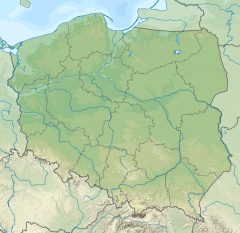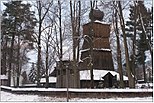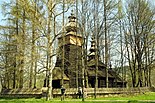Wooden churches of Southern Lesser Poland
| UNESCO World Heritage Site | |
|---|---|
 Old church in Sękowa | |
| Location | Lesser Poland Voivodeship, Poland |
| Includes | |
| Criteria | Cultural: (iii), (iv) |
| Reference | 1053rev |
| Inscription | 2003 (27th Session) |
| Area | 8.26 ha (20.4 acres) |
| Buffer zone | 242 ha (600 acres) |
| Coordinates | 49°45′N 21°14′E / 49.750°N 21.233°E |
The wooden churches of southern Lesser Poland (Polish: drewniane kościoły południowej Małopolski) of the UNESCO inscription are located in Binarowa, Blizne, Dębno, Haczów, Lipnica Murowana, and Sękowa (Lesser Poland Voivodeship or Małopolska).[1] There are in fact many others of the region which fit the description: "The wooden churches of southern Little Poland represent outstanding examples of the different aspects of medieval church-building traditions in Roman Catholic culture. Built using the horizontal log technique, common in eastern and northern Europe since the Middle Ages..."
The wooden church style of the region originated in the late Medieval, the late sixteenth century, and began with Gothic ornament and polychrome detail, but because they were timber construction, the structure, general form, and feeling is entirely different from the gothic architecture or Polish Gothic (in stone or brick). Later construction show Rococo and Baroque ornamental influence. The form of these Roman Catholic churches is deeply influenced by the Greco-Catholic and Orthodox presence in the region. Some display Greek cross plans and onion domes, but the most interesting of the churches combine these features with the Roman forms with elongated naves and steeples. Other collections of wooden churches of the region are in the open-air museums in Sanok and Nowy Sącz.
St. Michael Archangel's Church, Binarowa
[edit]

All Saints Church, Blizne
[edit]
St. Michael Archangel's Church, Dębno
[edit]
Assumption of Holy Mary Church, Haczów
[edit]
St. Leonard's Church, Lipnica Murowana
[edit]
Saints Philip and James Church, Sękowa
[edit]
Other wooden churches of the region
[edit]-
Church of Sts. Peter and Paul in Lachowice, 1789-1791
-
John the Baptist Church in Orawka, interior
-
John the Baptist Church in Orawka, circa 1750
-
John the Baptist Church in Rzepiennik Biskupi from 16th century
-
St. Michael the Archangel Church in Szalowa, from 18th century
-
St. Michael in Szalowa, interior
-
St. Jacob Church in Powroźnik from 1604
-
St. Martin church in Grywałd from 16th/17th century
-
St. Dorothy Church in Trzcinica from end of 15th century
-
St Paraskeva Church in Kwiatoń from 17th century
-
Nawiedzenia Church in Iwkowa from 15th-17th centuries
-
St. Catherine Church in Gogołów from 1672
See also
[edit]- Wooden churches in Ukraine
- Carpathian Wooden Churches
- Vernacular architecture of the Carpathians
- Wooden Churches of Maramureş
- St. George's Church, Drohobych
- Kryvka Church
- Wooden synagogues of the former Polish-Lithuanian Commonwealth
- Zakopane Style architecture
- Lesser Poland
References
[edit]- ^ World Heritage Site. "Wooden Churches of Southern Małopolska". Inscription. UNESCO. Retrieved 2017-11-21.













